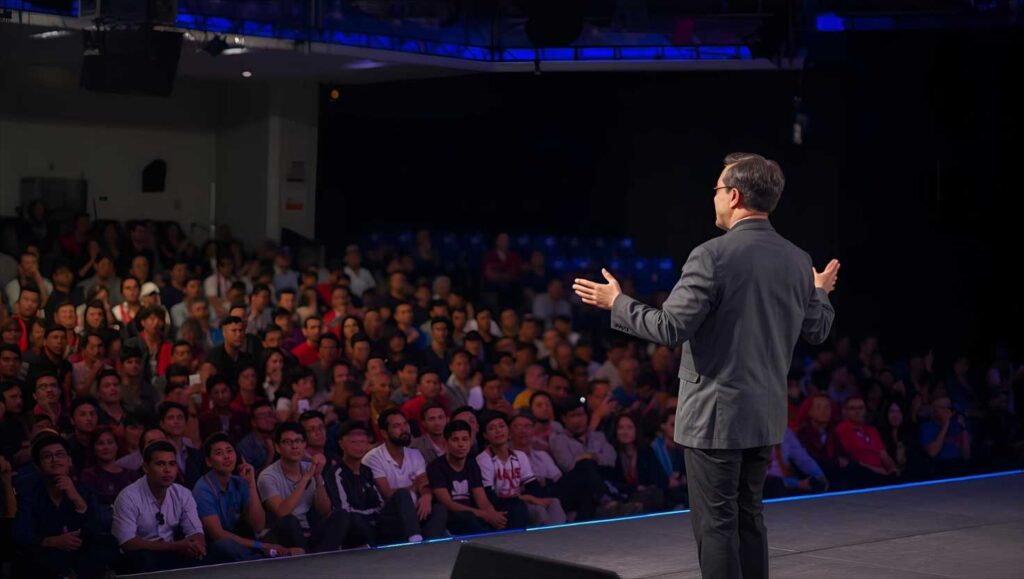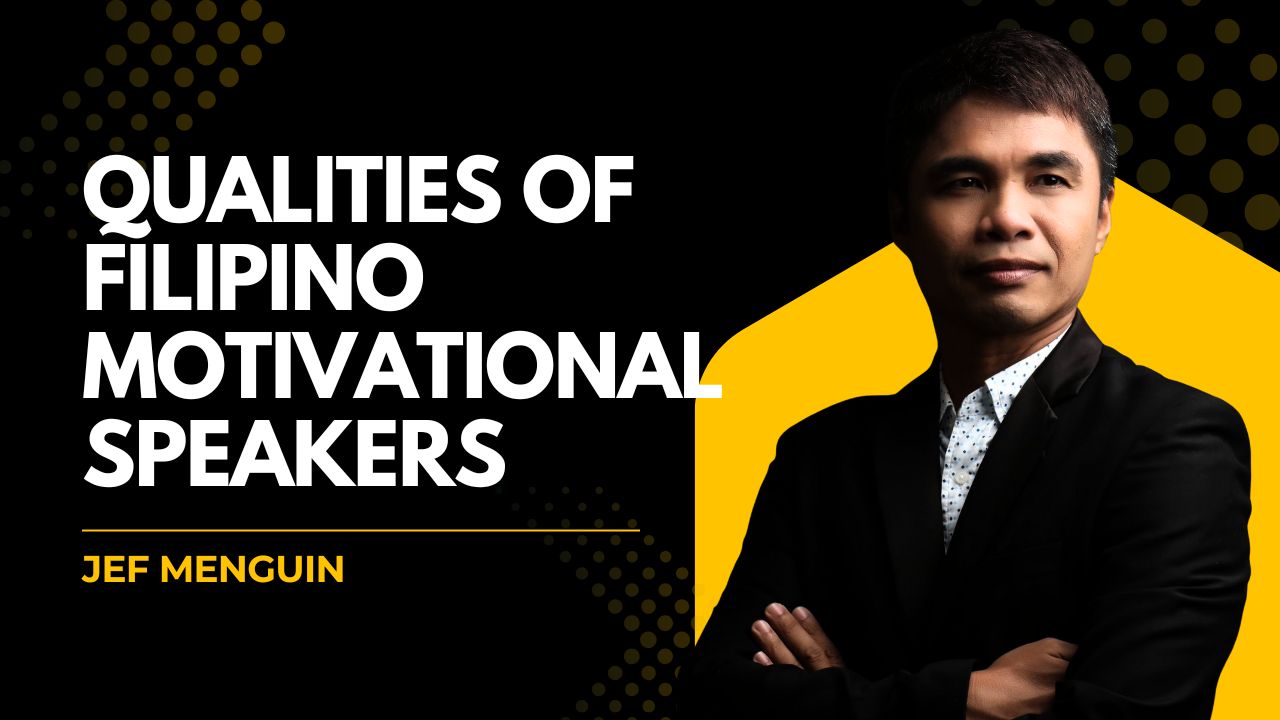Motivational speaking is often misunderstood. Many think it’s about shouting on stage, throwing in jokes, or flashing inspirational quotes. But real motivational speaking is not about hype—it’s about creating human shifts.
In the Philippines, where stories, values, and relationships shape how we live, an effective motivational speaker does more than inspire for a day. They help people see themselves differently, connect to their deepest values, and carry that energy into real action.
When done well, motivational speaking is both art and service. It is the art of storytelling, presence, and connection—and the service of helping others believe, decide, and act in new ways.
1: Authentic Storytelling
Stories move people more than slides.
I still remember my early years as a high school teacher. I worked long hours, said yes to every task, and took home a salary of just ₱6,000 a month. On paper, I looked hardworking. Inside, I felt stuck.
When I share this story with audiences, people nod. Some laugh in recognition. Others look down, remembering their own struggles. They connect not because the story is extraordinary, but because it’s true.
This is what authentic storytelling does. It turns a private struggle into a shared mirror. Filipinos don’t need perfect heroes—they need to see someone real who has been where they are. A good motivational speaker doesn’t tell stories to impress. They tell stories to connect.
I’ve learned that people don’t remember all the bullet points from a talk. But they remember the story that made them feel seen. That’s the power of authenticity.
2: Cultural Connection
An effective speaker speaks to Filipino hearts.
Motivational speaking in the Philippines is different. Here, people are moved not just by logic, but by loob (inner self), by pakikipagkapwa (seeing the other as your equal), and by bayanihan (helping each other rise).
When Yolanda devastated Tacloban, volunteers came from everywhere. They weren’t paid. They didn’t come for certificates. They came because of mabuting loob—the Filipino instinct to help. That same spirit moves audiences when a speaker honors Filipino values on stage.
I’ve seen this in my own talks. In provinces where resources are scarce, stories about resilience through bayanihan connect more than quotes from Silicon Valley. In corporate halls, reminding teams that “we rise together” brings energy that no imported framework can match.
A motivational speaker who connects to Filipino culture doesn’t just deliver a talk—they deliver a reminder of who we are. And in a world flooded with generic, AI-written inspiration, this cultural resonance is what makes the message unforgettable.
Authentic stories and cultural grounding build trust. But once trust is earned, the next step is clarity. Because a message that isn’t clear—no matter how heartfelt—will never move people into lasting action.
3: Clarity of Message
The best speakers make complex truths simple and memorable.
A talk doesn’t change people if the message is confusing. You can have brilliant ideas, but if they are wrapped in jargon or endless slides, the audience leaves entertained but not transformed.
An effective motivational speaker knows how to cut through the noise and give people a message they can carry home. Something short, sharp, and repeatable.
When I speak, I try to give my audience a phrase they can remember even weeks later. “Start with one shift.” “Greatness begins with small wins.” “Work like an artist.” These aren’t just slogans—they’re anchors. They stick because they’re simple, but they open doors to deeper meaning.
I once gave a talk where I ended with just one question: “What’s the one shift you will make today?” Months later, I received an email from someone who had been in the room. He said, “That question kept echoing in my head. It made me decide to finally start my small business.”
That’s clarity. It’s not about giving people 20 points. It’s about giving them one message they can hold onto until it moves them.
4: Presence and Energy
Motivation is contagious—energy spreads in the room.
A great talk isn’t just about words. It’s about presence—the way a speaker walks into a room, holds silence, makes eye contact, and shifts the atmosphere. People don’t just listen to your voice. They feel your energy.
I’ve seen this in sleepy corporate workshops, where participants drag their feet after lunch. The slides don’t matter in that moment. What matters is how you stand, how you engage, how you lift the room. Sometimes, it starts with a smile. Sometimes, with a well-placed story that makes everyone laugh.
Once, during a leadership seminar, I noticed heads drooping after a heavy session. Instead of pushing through, I paused, cracked a story about my own early failures, and asked everyone to stand and share their funniest mistake. The room came alive. Energy shifted. Learning stuck again.
That’s presence: knowing when to press, when to pause, and when to play.
Filipinos respond deeply to warmth and energy. We follow people not just for what they say, but for how they make us feel. An effective motivational speaker carries energy that lingers long after the talk is over.
Stories connect, culture grounds, clarity guides, and presence energizes. But all of these must lead somewhere. The true test of a motivational speaker is whether they can design shifts that last. That’s our next quality.
5: Ability to Design Shifts
Motivational speaking is not about hype—it’s about creating change that sticks.
I once worked with a call center team on the night shift. They had good salaries, bonuses, even free coffee—but energy was low. Management thought the solution was to give bigger incentives. But that didn’t work.
So we tried something different. We created a small wins board where every resolved customer issue was written down. Overnight, the team stopped seeing themselves as script readers. They saw themselves as problem solvers.
That was a shift.
A good motivational speaker doesn’t just deliver stories. They design experiences that move people from one state to another—disengaged to engaged, powerless to capable, ordinary employee to leader.
In my talks, I always ask: “What shift will they take home with them?” It could be a new identity (“I am a finisher”). It could be a new habit (celebrating small wins). It could be a new story (“We rise together”).
The applause fades, but the shift remains. That’s the mark of an effective speaker.

6: Audience Engagement
The best talks feel like conversations, not monologues.
Filipinos don’t like being lectured at. We like being part of the story. That’s why the most effective motivational speakers don’t just talk to the audience—they talk with them.
I remember a leadership workshop in Bohol where the first session felt heavy. People were polite, but distant. So I asked a simple question: “What’s the bravest thing you’ve done this year?” At first, silence. Then one hand. Then another. Soon the room was alive with laughter, tears, and nods of recognition.
That’s engagement.
Engagement isn’t about gimmicks. It’s about giving people a chance to see themselves in the talk. Sometimes it’s a reflection question. Sometimes it’s a quick pair-share. Sometimes it’s an invitation to stand up and move.
When audiences engage, they don’t just listen—they own the experience. And when they own it, they carry it forward.
Engagement makes the talk alive in the moment. But for motivation to last beyond the room, the message must also be practical and relevant to daily life. That’s our next quality.
7: Relevance and Practicality
Talks must connect directly to the audience’s real life.
One of the fastest ways to lose an audience is to give them abstract ideas with no connection to their daily challenges. People nod politely but go home unchanged.
I’ve seen this happen when companies bring in speakers who copy Western frameworks word-for-word. The ideas sound good, but the employees wonder: “How does this apply to us?”
That’s why relevance is everything.
In my talks, I make it a point to connect lessons to what people already face at work or at home. When I speak to leaders, I talk about decisions they’ll make the next day. When I speak to teachers, I draw from my own years in the classroom. When I speak to executives, I share stories of leading teams, not just theories from books.
I once had a manager tell me: “Jef, your talk was practical. My team applied it the next day.” That’s when you know the message landed.
A motivational speaker in the Philippines must bridge inspiration with action—so that people leave not just inspired, but equipped.
8: Credibility and Integrity
People listen when they trust the speaker.
In the Philippines, credibility isn’t just about titles or degrees—it’s about character. People ask: “Does this speaker live what he teaches?”
When I share my story of being a young teacher earning only ₱6,000, I don’t present it as a rags-to-riches tale. I present it as a journey of integrity, of staying committed to growth, of turning small wins into shifts. People believe me not because I’m perfect, but because I’m consistent.
Integrity also means saying no to shortcuts. I’ve seen speakers exaggerate their stories or claim success they haven’t really earned. The audience might clap in the moment, but they sense the gap. Over time, trust erodes.
An effective motivational speaker doesn’t just deliver powerful words. He models them. He shows in his life the values he talks about on stage.
In my own journey, that’s why I continue to write books, design playbooks, and create tools. It’s not just to speak—it’s to live the message in ways people can see and use. That consistency builds credibility.
Credibility earns trust, but every audience is different. The best speakers know how to adapt—not just to who’s in front of them, but to the energy in the room. That’s our next quality.

9: Adaptability to Context
Every audience is different—great speakers adjust on the spot.
No two talks are ever the same. The slides may look similar, but the people in front of you bring their own energy, challenges, and culture. An effective motivational speaker knows how to read the room and adapt.
I’ve had moments where my prepared outline didn’t fit the mood. In one corporate event, I was scheduled right after a long technical session. The room was drained. If I had stuck to my original script, I would have lost them. Instead, I started with humor, invited movement, and only then eased into the core message. The shift in energy opened the door for the message to land.
Adaptability means knowing when to pause, when to go deeper, and when to lighten the room. It’s not about performing a script—it’s about serving people in the moment.
Filipino audiences, in particular, appreciate speakers who can feel the room. We want someone who doesn’t just talk at us, but talks with us. That’s adaptability in action.
10: A Bigger Purpose
Effective speakers move beyond applause to transformation.
At the end of a talk, applause feels good. But applause is not the goal.
The most effective motivational speakers in the Philippines don’t just aim to entertain or impress—they aim to serve a bigger purpose. They see themselves as builders of leaders, carriers of values, catalysts of change.
I often tell audiences: “Greatness begins with one shift.” For me, motivational speaking is not about being on stage—it’s about helping people take that shift into their lives, their work, and their communities.
I’ve carried this purpose from the classroom to the stage, from writing books to designing playbooks. It’s the same heartbeat: to create shifts that multiply.
That bigger purpose is what keeps a speaker grounded, authentic, and impactful. Without it, talks become performances. With it, talks become movements.
These ten qualities—authentic storytelling, cultural connection, clarity, presence, shift design, engagement, practicality, credibility, adaptability, and bigger purpose—are what separate hype-driven talks from transformational ones. To make the difference clear, let’s put them side by side.
Hype vs. Effective Motivational Speakers in the Philippines
The difference is in the depth of impact.
| Hype-Driven Speaker | Effective Motivational Speaker |
|---|---|
| Delivers excitement only | Creates shifts and identity change |
| Generic, borrowed stories | Authentic, lived Filipino stories |
| Talks at the audience | Engages and involves the audience |
| Leaves with applause | Leaves with transformation |
| Focused on performance | Focused on purpose and service |
FAQ: Choosing a Motivational Speaker in the Philippines
Q1. How much does it cost to hire a motivational speaker in the Philippines?
Fees vary. Some charge a few thousand pesos, others ₱30,000 to ₱50,000 for half- or full-day sessions, while high-profile speakers command more. What matters is not the price tag but the value created. Ask yourself: “Will this speaker deliver lasting impact, or just a fun moment?”
Q2. What’s the difference between a trainer and a motivational speaker?
A trainer teaches skills and provides structured learning. A motivational speaker inspires shifts in mindset and behavior. Both are important, but they serve different purposes. The best speakers often blend both—sharing stories and inspiration, while also leaving tools people can use.
Q3. How do I know if a speaker is credible?
Look at their body of work. Do they live what they teach? Do they have stories rooted in real experience? Have they worked with schools, companies, or communities like yours? Credibility is built on consistency, not just charisma.
Q4. Why not just use AI videos or YouTube clips instead of a live speaker?
You can—and many organizations try. But videos don’t adapt to your team’s energy. They don’t carry lived vulnerability. They don’t create shared laughter in the room. AI and videos deliver information. Human speakers deliver connection. That’s the difference.
Why These Qualities Matter Now
In the Philippines, motivational speaking is not about hype—it’s about shifts that last.
I’ve seen speakers who make people laugh, clap, and shout—but leave them unchanged. And I’ve seen speakers who make people quiet, reflective, and then decisive—ready to carry a story or shift back to work and life.
That’s the difference these ten qualities make. They separate a talk that fades from a talk that multiplies.
If you’re looking for a motivational speaker in the Philippines, don’t settle for hype. Look for authenticity, cultural connection, clarity, presence, shift design, engagement, practicality, credibility, adaptability, and a bigger purpose. Those are the qualities that move Filipinos—not just for a day, but for the long haul.
And if you’d like to see how I bring these qualities into my own speaking, you can explore more here: Motivational Speaker Philippines.

